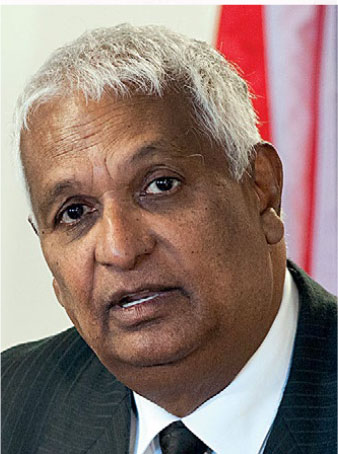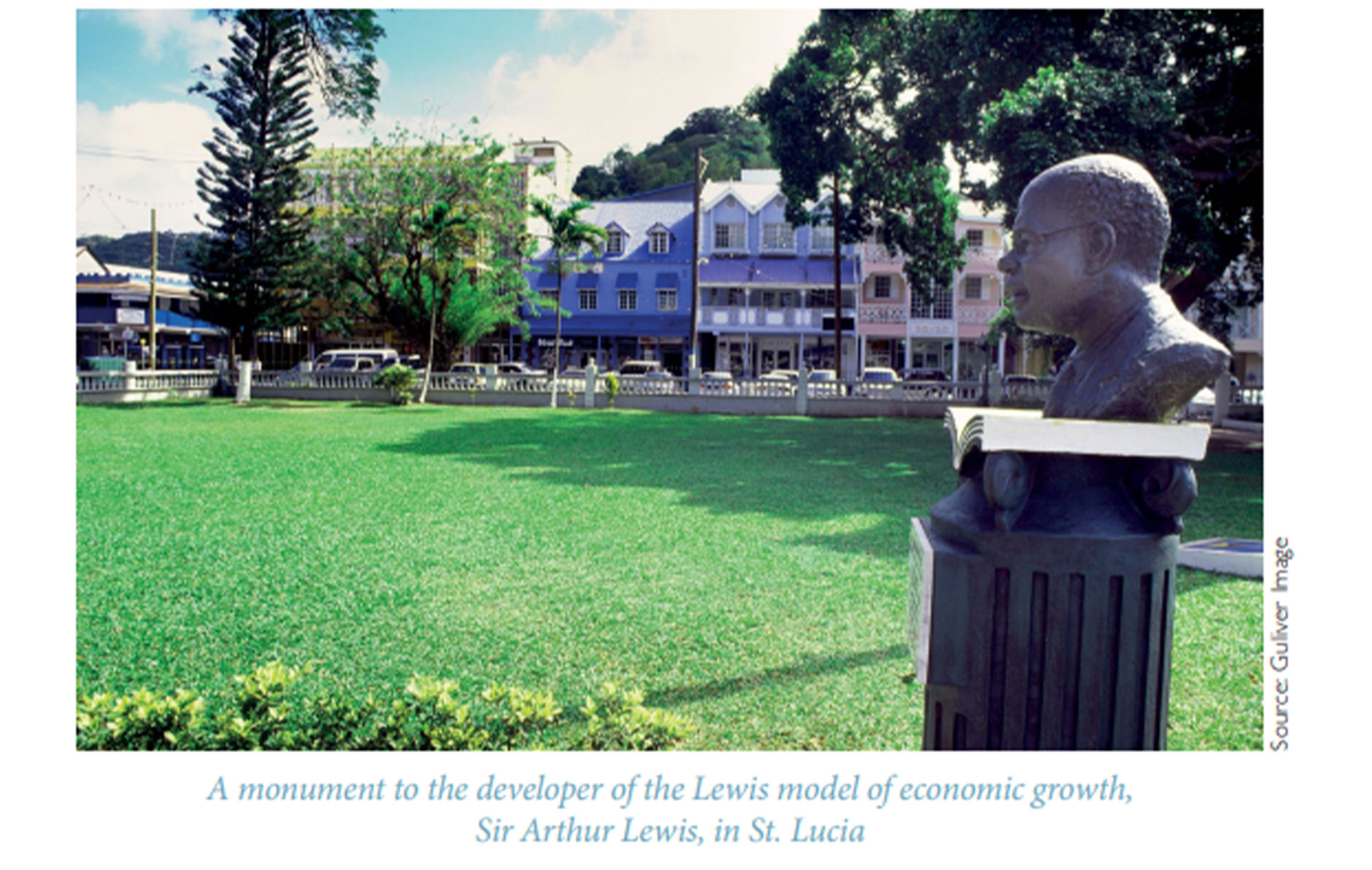
 Winston Dookeran is Secretary General of EUCLID University. His former positions include those of Professor of Practice at the University of the West Indies, Governor of the Central Bank, and Minister of Finance and Foreign Affairs of the Republic of Trinidad and Tobago. Andres Rugeles is a Visiting Fellow at the University of Oxford and Member of the Advisory Board of the Global South Unit of the London School of Economics.
Winston Dookeran is Secretary General of EUCLID University. His former positions include those of Professor of Practice at the University of the West Indies, Governor of the Central Bank, and Minister of Finance and Foreign Affairs of the Republic of Trinidad and Tobago. Andres Rugeles is a Visiting Fellow at the University of Oxford and Member of the Advisory Board of the Global South Unit of the London School of Economics.
"The Caribbean space has many “Caribbeans,” each with their own distinct historical story, but a common quest to advance its economic reach throughout and outside the region. In today’s times, geostrategic shifts in global leadership are opening up new possibilities in foreign policy and a rethink in ‘macroeconomic’ growth strategies for development. The old and tested paradigms are under stress—in development and diplomacy—and the search for new ideas are at our doorsteps. In a 2023 policy brief entitled “Towards a Consensus of the Global South,” Rugeles notes that we are evolving from the theories of Raul Prebisch and the “Washington Consensus” towards a “Global South Consensus” that promotes sustainable, stable, and equitable development. New political leadership, greater international cooperation and intelligent international integration are key elements to this end."
The Lewis model of economic growth, developed by Caribbean economist and Nobel laureate Sir Arthur Lewis, and rooted in classical analysis, is credited as seminal to the understanding of development economics, more so in its application to the Caribbean. Industrialization by invitation was a key policy outcome which envisaged the attraction of foreign direct investment to drive the development of industry. Much has happened since then. Diplomacy continues to evolve, hegemonic struggles are intensifying, and multilateralism and regionalism are taking new forms, all within the context of a climate crisis threatening Small Island Developing States (SIDs) in particular, and other vulnerable countries. These new stress factors will impact the ideas for development in the regional and global setting.
In a recent paper entitled “Policy Shifts and Analytics in the Caribbean Setting: Stress testing, growth models the liberal order in the COVID-19 reset,” Winston Dookeran elaborated on Rugeles’s earlier comment by focusing on some key ideas in development, which include linearity in growth models, convergence in the integration process, frontier analysis in the development framework, and complexity in the diversification strategy. These ideas, if translated into practical policy measures, may enhance the potential for sustainable, stable, and equitable development in the current global context, thus fostering strategies to advance the common quest for enhanced Caribbean economic reach and higher levels of development.

New Approaches and their Applicability to the Caribbean
The non-linear approach has given rise to the notion of a circular economy, where recycling, re-use and recovery of materials add to resource efficiency and increased productivity. Reduced productivity has been a feature of Caribbean economies, and the idea of circularity could deepen change in the operating system of the economy. On the issue of integration, there is a renewed search for new models in Latin America and the Caribbean (LAC). The limits of the traditional integration model may have arrived, opening up a new literature on economic convergence. The economic logic of convergence is not just about the enlargement of markets and trade, but also creating new economic space, which is inwardly resilient, globally competitive, and able to capture future opportunities in the shifting global order. This is an institutional challenge, perhaps best exemplified by the experience of the Pacific Alliance which was established in 2011 between Chile, Columbia, Mexico, and Peru. Trinidad and Tobago became an Observer Member to the Pacific Alliance viewing it then, as an initiative at regional economic convergence.
Manfred Jantzen recently produced a major treatise Frontiers on Human Enterprise Progress on Spaceship Earth (2023), where he crafted a frontier development framework which focuses on the catalytic role of the state, transforming the growth culture, integrating the informal sector into the economy and aligning public and private institutions toward performance. He asserts that the COVID-19 pandemic may be a tipping point for a new global frontier that will reset, reconceptualize, and redirect global priorities that impact on the existing paradigms for development. In applying this framework to the Caribbean, Manfred spells out strategies on innovative competitiveness, endogenous growth, inclusive development and institutional alignment, in what he calls a one-world information space.
A persistent challenge for the Caribbean continues to be economic diversification. This has led to an emphasis on the notion of complexity as an appropriate framework to a non-linear approach to development. It is based on the complex adaptive system as an appropriate tool for the study of development. Measuring the degree of complexity of the economy explains the efficacy of policy responses in areas like the exchange rate and inflation. These issues have practical consequences on overall economic well-being and the issues of equitable development. Studies of complexity will provide a new lens for looking at old problems, and amplify the obstacles in the pathway for building diversified economic structures with global reach. Policymakers will therefore be required to address these obstacles in innovative ways, leveraging relationships particularly in the Global South and introducing bold reforms where necessary.
The Geopolitical Context
These development ideas—the circular economy, convergence in regionalism, frontier frameworks, and complexity analysis—are becoming increasingly relevant in this post hegemonic stage of global politics. It is also urgent because of the demands on research and scholarship, and calls for a reframing of these agendas. This agenda resetting is absolutely essential for our academics, practitioners, and institutions. Noted scholar, Andy Knight asked the following question in International Organization and Global Governance (2018): “would the evolving world order focus on ‘ideas and ideology’ and could that be decoupled from the military, economic and technological sources of power.” As John Bew eloquently explained in his 2016 book Realpolitik: A History, “ideas are important in politics—increasingly so in the democratic age—but their importance will be judged by their political force rather than their purity or elegance.” Both authors emphasize the age-old and complex dichotomies of ideas vis-a-vis force and physical power vis-a-vis intellectual power. The current geopolitical context emphasizes the need for a new strategy. In his book Latin American Foreign Policies in the New World Order: The Active Non-Alignment Option (2023), Heine puts forth an ambitious guide to foreign policy action in what he calls “a world of turmoil.” Heine calls this a time for active non-alignment—to place the national interest at the center, not formally aligned with or against any major power or bloc. The ideas for development in the Caribbean at a time of global political shifts and new thinking in development economics requires what Manfred Jantzen calls “frontier strategy leadership.” In his aforementioned treatise, Jantzen explains that “in this one-world information space, where economic borders are disappearing and political sovereign borders are being challenged, the Frontier Thought Leaders must cultivate a global mind-set capable of complex thinking.”
The Role of Institutions
Global institutions continue to be critical in the progress of countries of the global south. Global economic institutions are even more critical in this regard today, particularly development banks. So, what is the development force of development banks today? There is a need for stress testing the effectiveness of development banks to promote development, not only in the context of the United Nations Sustainable Development Goals, but equally regarding their impact on the ideas of development raised in this article. For the Caribbean, this is acute, as growth without development, what Rugeles refers to as the ‘middle income trap,’ has been a recurring structural challenge facing countries of the region. Development banks must address these structural issues in their quest to retain relevance in working for the development of the countries they serve.
Fernandez de Soto and Rugeles in a recent LSE paper entitled “Global Megatrends that Challenge Latin America” invoked what they called a period of “Cold Peace amidst new global actors” in reference to the current global economic context, existing institutions, and the place of the LAC in it. They noted that “Ideas, and interests are emerging that will redefine the post war international system and its governance.” In this period, the authors spell out the mega trends facing the LAC, and asserted that “multilateralism will be tested,” and so too will be the leadership of key industries for the future, among these: “information technologies, robotics, renewable energies, electric cars, biotechnology, medicine, aerospace equipment, agricultural machinery.” We live, they say, in a period of global supply and consumption chains, de-globalization, decoupling, nearshoring, friendship-shoring or energy shoring. These mega trends, rooted in economic enterprise also underline the need for new alignments in the conduct of economic diplomacy. Policymakers and leaders are therefore required to adjust accordingly.
A Passing of the Torch
The current period has made it evident that we’re in a transitional moment. The challenges of the mid-twenty-first century, the epoch which we’re about to enter, are existential in nature even more so than those of the past. The threat of nuclear proliferation appears unabated, with conflicts like the Russia-Ukraine war providing momentum to the argument by some that nuclear weapon capacity is the only way to offset their conventional military inferiority and create some degree of parity. Climate change shows that drastic changes are needed to our habits of energy consumption, or our world would become even more uninhabitable for future generations. The COVID-19 pandemic, the monkey pox emergency, and other health emergencies are now less localized and increasingly global. The democratization of the media, early heralded as the dawn of a new age of engaged democracy, now increasingly shows enormous vulnerabilities with regard to manipulations of public sentiment. Such a reality now threatens our democratic institutions, the bedrock of modern civilization. These issues present a global challenge in an increasingly fragmented world. So where do we turn?
Whilst the current generation of leaders in some instances continue to perform admirably on many of these questions, answers to many of the world’s problems are almost instinctively buried in today’s youth. They are the natives of this time, and therefore the capacity for the solutions of today will likely originate in their minds, and will most certainly be applied by them. Whilst history provides a host of lessons which may be applicable to today’s problems, today’s unique challenges require unique solutions. Solutions like the need to implement sustainable and reliable modes for hybrid work, sustainable renewable energy sources, digitization of our public services, and many others are only in their infancy of development. The willingness of our current leaders to embrace the inevitable change of our new generation is therefore critical. Trinidad and Tobago’s leadership at the 78th Session of the United Nations General Assembly (UNGA) provides us a unique opportunity and platform for Caribbean leadership on the global level. It is anticipated that many of the aforementioned issues will be addressed in some form, with the talent and expertise of the small twin-island nation on display. Let us hope that in the future we look back at Trinidad and Tobago’s contributions throughout 2024 as a turning point in the ability of the UNGA to produce concrete outcomes for its most vulnerable members.







